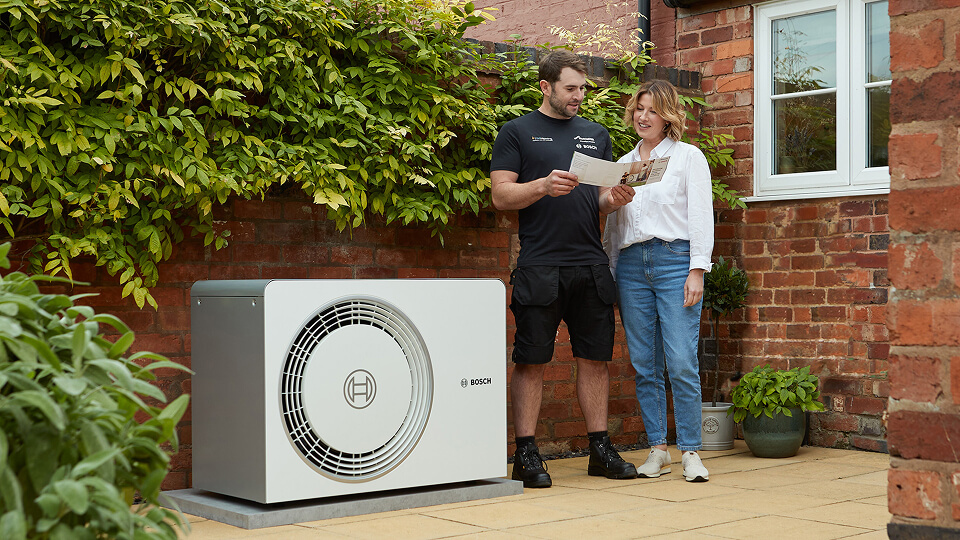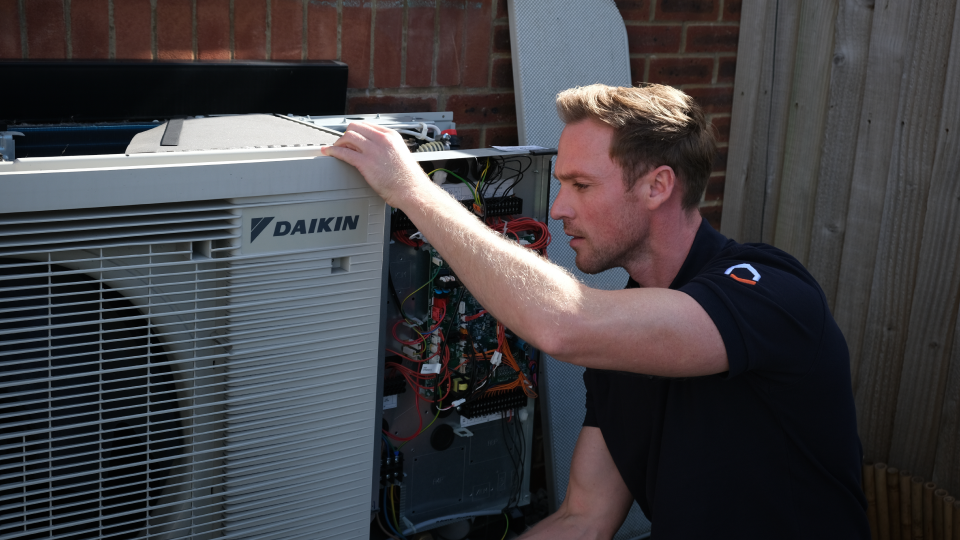The efficiency and cost-effectiveness of boilers versus heat pumps have been hotly debated in recent times. Air source heat pumps are a renewable heating system that draws warmth from the outside air to heat your home and water. Working a bit like a fridge in reverse, it’s an energy-efficient alternative to traditional gas boilers, reducing bills and carbon emissions.
Choosing between a gas boiler and a heat pump isn’t always straightforward. Both have pros and cons, but understanding how they differ can help you decide which option is best for you.
While gas boilers typically have a lower upfront cost, heat pumps (particularly air source models) offer better energy efficiency, carbon savings, and lower long-term running costs.
With fluctuating energy prices and sustainability on everyone’s mind, more homeowners are asking whether it’s time to switch from traditional gas boilers to air source heat pumps. But which is cheaper to run?
The answer depends on your home, energy usage, and system efficiency. While gas still wins in some scenarios, air source heat pumps are quickly catching up – and often outperform gas boilers in the long run.
We’re taking a closer look at how gas boilers and air source heat pumps stack up on running costs, showing which heating system offers better efficiency, lower bills, and long-term savings.

How much does it cost to run a heat pump vs a gas boiler?
| Heating system | Estimated annual cost (UK) | Typical efficiency | Average lifespan |
|---|---|---|---|
| Gas Boiler | £630 – £1,100 | 88 – 95% (A-rated) | 10 – 15 years |
| Air Source Heat Pump | £734 – £938 | 250 – 400% (SCOP 2.5 – 4) | 20+ years |
While gas is currently cheaper per unit of energy (kWh), air source heat pumps are offset with high efficiency, converting electricity into 2.5 – 4 times more heat than they use in energy.
The result? In well-insulated homes or those with smart heating controls, a heat pump can match or even beat a gas boiler on running costs, especially when paired with a suitable energy tariff or solar PV system.
What does heat pump efficiency mean for your energy bills
One of the main reasons air source heat pumps are contenders with gas boilers on running costs is in heat production. While boilers burn fuel to create warmth, heat pumps transfer heat from the outside air into your home, even in cold weather.
That process uses electricity, but it’s highly efficient, delivering 2.5 to 4kWh of heat for every 1kWh of electricity used. That’s a level of performance no conventional boiler can match.
Optimum performance depends on proper design and setup. A heat pump in a well-insulated home with the right flow temperatures and heating controls will often outperform a traditional boiler.
Smart controls, weather compensation or underfloor heating boost efficiency still further, bringing energy bills down while maintaining a consistent temperature.
What really affects cost-effectiveness?
The cost of running your heating system isn’t just about fuel prices – it’s about how your home performs, your energy tariff, and your system set-up. Here are the biggest factors affecting running costs:
Insulation and EPC Rating
Air source heat pumps work best in well-insulated homes. If your property has an Energy Performance Certificate (EPC) rating of C or higher, you’re more likely to benefit from lower running costs with a heat pump.
Poorly insulated homes make even the most efficient system work harder, pushing up electricity usage and bills.
Energy tariffs
Electricity is currently more expensive per unit than gas, but the following savings can still be made:
- Time-of-use tariffs offering cheaper rates during off-peak hours
- Some energy providers now offer heat pump-specific tariffs
- Pairing with solar PV can offset a large portion of electricity costs
Meanwhile, gas prices remain unpredictable and could rise if due to carbon levies or fossil fuel phase-outs.
Usage patterns and system setup
If you’re heating a large home or running your system for longer periods, a heat pump could cost less than gas, especially if running at low temperatures.
Homes with underfloor heating or low-temperature radiators are perfect matches for heat pumps, maintaining comfort without system overload.
Installation and maintenance – upfront vs lifetime value
What about the full picture? To understand the true value of a heating system, it’s important to look at installation and ongoing maintenance too.
| Heating system | Install Cost (est.) | Maintenance frequency | Average lifespan |
|---|---|---|---|
| Gas Boiler | £1,000 – £4,000 | Annually (£70 –£130/year) | 10 – 15 years |
| Air Source Heat Pump | £7,000 – £13,000 (before grants) | Every 1 – 2 years (£150 – £200) | 20+ years |
While heat pumps have a higher upfront cost, government incentives such as the Boiler Upgrade Scheme (BUS) can knock thousands off the installation price, bringing it closer to parity with high-end gas systems. The lifespan of a heat pump is often twice that of a gas boiler, especially when professionally serviced.
Over a 20-year period, many homeowners find the higher initial cost of a heat pump is offset by lower running and repair bills.
Long-term savings and environmental benefits
If you’re thinking beyond your next heating bill, a heat pump could make even more sense.
- Lower long-term running costs
With the right setup and insulation, many homeowners report annual savings of £300–£425 compared to oil or electric heating, and potentially even gas.
As electricity becomes greener and tariffs improve, those savings are expected to grow, especially for households with solar PV or heat pump-friendly tariffs.
- Fewer repairs with a longer life
Heat pumps are known for their reliability. With fewer moving parts than a combustion boiler, they need fewer repairs and last longer – up to 20 years or more when properly maintained. That means fewer callouts, lower stress, and better return on investment.
- Lower carbon footprint
Heat pumps can reduce your home’s carbon emissions by up to 70%, depending on where you switch from. If you’re replacing oil or LPG, the environmental impact is even greater.
That matters for the planet and your property. As low-carbon heating becomes the norm, homes with heat pumps may enjoy stronger resale value and avoid future carbon-related penalties.
Which is cheaper to run?
- In poorly insulated or smaller homes, gas may still be cheaper in the short term
- In well-insulated homes, air source heat pumps can match or beat gas boilers on running costs
- With smart tariffs or solar PV, heat pumps become even more cost-effective
- Lower maintenance needs and longer lifespan often make heat pumps a better value option
So, if you’re thinking short term, gas might seem simpler. But if you’re planning for comfort, efficiency, and lower lifetime costs, a heat pump gives you the edge.
Choose the right system for your lifestyle and the future
Deciding between a gas boiler and an air source heat pump is about the bigger picture – your home’s efficiency, energy habits, and what matters most to you in the long run.
Air source heat pumps offer a convincing mix of low-carbon comfort, long-term savings, and future-ready technology, paired with expert advice and regular servicing. Contact ServiceMy today for tailored guidance, honest answers, and professional support every step of the way.
Schedule Your Heat Pump Service Today
Don’t wait until efficiency drops, or your pump encounters issues. Investing in routine maintenance for your air source heat pump is the best way to keep your household energy-efficient, cosy, and cost-effective year-round.
Get in touch with our professional servicing team today to schedule your appointment. With extensive experience in heat pump servicing and home energy solutions, we’re here to help you stay warm, save money, and protect your investment.
Maintain your heat pump, and it will reward you with years of efficient and reliable performance!
